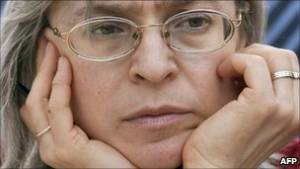Remembering Anna Politkovskaya

‘What did I do that was so bad?’
‘I abhor the ideology that governs us: “us” versus the “enemies”. If he is “our” journalist he enjoys public notoriety and rewards, he might even be invited to Parliament. […] If a journalist is not “one of our own”, if he belongs to the opposition, at the moment it is guaranteed repudiation. I never aspired to my own repudiation – I never wanted to end up stranded like a dolphin on the shore. Underneath it all I am not a political fighter.’
These are posthumous words of Anna Politkovskaya. The text was found on her computer after her death, without any clear indication of why she had written it. Probably to be read abroad, when receiving one more award for her precise, acute, incorruptible investigative journalism. Anna’s colleague, with whom she shared a desk each day at Novaya Gazeta, has written that every time she congratulated her for a new award, Anna seemed unhappy. Her usual reply was simply: “They don’t want to understand. They do not listen. They actually don’t care. It’s not so great, my dear.” Anna was not interested in her personal prestige, rather she wanted people to see the way truth was being destroyed, she wanted people to listen to the suffering of countless victims, to the daily crimes she was able to describe with such precision in Putin’s Russia.
Did we listen then? Are we ready to listen to her today? The division between us versus the enemies has only grown in Russia to give birth to overwhelming tones of propaganda. In front of it, we admire the courage of journalists under pressure who know better than anyone else that “propaganda is the collapse of language” –to borrow Lev Rubinstein’s words. Anna’s country lives under what PEN has called “a tsunami of anti-free expression laws emerging in Russia, which include treating international NGO’s as foreign agents; anti-gay laws; a law permitting the blocking of websites without a court order; laws against discussing Russian history; a Religious Defamation law.”) John Ralston Saul, president of PEN International, has just this week participated in a series of dialogues between Russian and Ukrainian writers with European colleagues at the Odessa Literary Festival, to explore ways of countering propaganda with debates, dialogue and research.
Today, nine years after her assassination, on Vladimir Putin’s birthday, we may read again Anna’s posthumous words:
’So what did I do that was so bad? I only wrote what I myself had witnessed. Nothing more. I am purposefully not going to expand on the other “vicissitudes” of the path I have chosen. A Poisoning. Arrests. Threats through the post and on the internet. Anonymous callers promising to kill me. I don’t think it matters. What matters is that I can do my job. Describe life, receive people in the office every day, because people have nowhere else to go with their troubles. The authorities don’t want to hear about it, because these troubles don’t fit in with the ideological framework of the Kremlin. And my newspaper, Novaya Gazeta, is just about the only one that can publish such testimonies.’
by Charles Torner #sthash.PaEx6fp7.0BMFHV8N.dpuf





